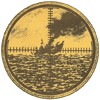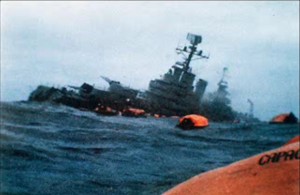Clive Ponting: ‘The Crown Jewels’ part 1.
Clive Ponting: ‘The Crown Jewels’ part 2.
Analysis: ‘Crown Jewels’ + Navy Cuts
Transcripts:
I’d like to start not in 1982 but in 1984 because in March of that year, I was moved at fairly short notice to become head of the division inside the Ministry of Defence that dealt with Naval Operations. And the first thing that was on my desk when I got there was the letter that Tam Dalyell has already mentioned this morning from the Shadow Cabinet questioning the Prime Minister about the accuracy of the accounts that had been given of the sinking of the Belgrano.
Interestingly I was asked by John Stanley, the Minister of State under Michael Heseltine to prepare two answers for the Prime Minister to send. One of them would tell the truth of what had happened, and the second would tell the government story that they had been telling for the previous two years.
When these papers arrived with Michael Heseltine he decided that he was in political trouble and that I should be asked to write a full account of what took place in 1982 based on all the available documentation. This was the study that have become known as ‘The Crown Jewels’ because it does contain a complete account, as far as we were able to deduce it, of everything that took place in April and May 1982.
Except interestingly one very important omission, and although I had complete access to documents within the Ministry of Defence including the Top Secret intelligence reports, the one set of documents that I was refused access to were the Foreign Office telegrams from Washington and Lima over the weekend of the 1st and 2nd of May.
I was only allowed to see two of those telegrams, which have subsequently become fairly well known; the telegrams from Washington and Lima announcing the Peruvian Peace Plan both timed after the sinking of the Belgrano. And the Foreign Office refused to allow me any access to any other telegrams, “If’, as they said; “they existed.”
Before I go on to sort of try and describe what was in ‘The Crown Jewels’ and the way it effects the way in which the war was run, I think it is important to try and understand, how the Ministry of Defence works, because without that I don’t think you can see any of the problems that were faced, and the sort of decisions that were being taken.
The Ministry of Defence isn’t a unified Ministry. It is split up into three separate Service Departments. And they are of course rivals with each other, they are not all working for exactly the same end. They are competing for money and resources most of the time, but also for prestige and position. And it is the job of Ministers to attempt to set the policy between the three services.
Now in 1982 John Nott left; he was still Secretary of State, but was in great disfavour with the Royal Navy because the year before he had presided over a Defence Review that had virtually, in the Navy’s view, seen the end of Britain as an ocean-going Navy. The main aircraft carrier The Invincible’ was to be sold to the Australians, all the major landing craft with the amphibious capability were to be scrapped, the number of frigates and war ships were to be severely reduced.
Now the Navy never accepted this policy and were forced to go along with it, and all the time were attempting to get it reversed. I think the important point is that about April-May 1982 was the time at which final decisions would be taken, and that ships would be actually be sold or sent off to the breakers yard.
And the other important point is I think the depth of the Government’s unpopularity early in 1982, and their extremely difficult political situation. Looking, I think desperately, for an issue, that would restore their popularity.
Transcript (part 2):
Although it is not really, I suppose, part of this inquiry, I think it is fascinating to actually read the Franks Committee Report on 3 April 1982, because much of what went wrong in the conflict itself, was foreshadowed then – the complete inability to actually produce a coherent policy on the Falklands: Britain was in the position of knowing or having decided they were not in a position to negotiate with the Argentines over the Falklands, except on the terms set by the Falkland Islanders. And that’s maybe a reasonable position for a government to take up, if it so decides.
Unfortunately they also knew, and were consistently told by their intelligence sources that if they took such a decision Argentina was quite likely to resort to military force at short notice. The neglect by the government was to do anything about it, was actually to plan to the defense of the Islanders, and to just assume that something would turn up.
Well nothing did turn up, and I think you have to imagine the scene in the Prime Minister’s room in the House of Commons on the evening of Wednesday 30th March. The cabinet was shell shocked to have finally been told by their intelligence advisors that the Argentines were almost certain to invade on the 2nd of April. They knew there was no time to send any forces to defend the islands and Thatcher is believed to have said she thought the government would fall.
At this moment of crisis, uninvited Admiral Sir Henry Leech, the Chief of the Naval Staff walked in, in full dress uniform having arrived from a private dinner. He assured the Prime Minister that the Navy would save the government, and if they sent a Task Force the islands might be recaptured after an invasion. This of course was what they wanted to hear.
At this time the Chief of the Defense Staff was not in the country, he was in New Zealand, and in this sort of vacuum the Royal Navy took over the whole control of the operation. And they had to have made, very early on I think, very crucal decisions about how the operation was to be controlled.
Now … the military, from their point of view, how they see the conflict, is that they should be allowed to get on with the job without the politicians controlling them very closely. Whereas it is the job of the politicians of course to balance military action and diplomatic action. That’s not the job of the military. The job of the military is to tell them what the forces can do and to say “this is what we think needs to be done”, but it’s for the politicians to decide.
Now the military were quiet determined that the operation was not going to be controlled from the Ministry of Defense Headquarters in Whitehall where – the same building of course where Ministers were in, and where Ministers would have easy access to the Chiefs of Staff Room and so on. They decided very early on that the operation was to be controlled by the Commander in Chief fleet at Northwood, one removed from London; and that all communications with Northwood would be through the Chiefs of Staff, and at the same time the actual Commander of the whole Task force would be in Northwood, and there would be a Commander on the spot actually running the Fleet, that was Sandy Woodward, but he never controlled any of the Submarines. They were controlled separately, also at Northwood.
So already you have go a very complicated picture and it turned out that during the whole of the operation the main blockage of information was not between the Falkland Islands and Northwood, but between Northwood and London. On many occasions I remember seeing John Notts Private Secretary, and he would be absolutely fuming and so would John Nott. They could not find out what was going on in the South Atlantic. They would be speaking to Northwood asking to find out where ships were, and being told “Well it’s 8000 miles away, we’ve only got one sattelite, we cant tal’k to them all, communications are down, we don’t know what is going on”. Only when they motored up to Northwood would they find the complete operations picture up on the board with every ship plotted, exactly where it was.
And the military were not prepared to tell the politicians things they didn’t think the politicians ought to hear; they wanted to keep the operation under their own control. So the information flow was from the South Atlantic to Northwood, then Northwood to the Chiefs of Staff, and then from the Chiefs of Staff to Ministers. Ministers didn’t have their own knowledge of what was going on. They were dependent on other people to tell them what was happening.


The fact is that RN had known since late 1970s sea trials its modern torpedo system and sonar was unreliable. There were problems throughout the manufacture process ending with management orchestrated falsification of RN Test records.
I now know a similar problem existed with Sea Wolf but I don’t think RN were aware of that.
I think Nott and Thatcher were briefed on the unreliability problem and the role of Leech was to persuade them to bluff and make contingency plans for a war crime attack outside EZ.